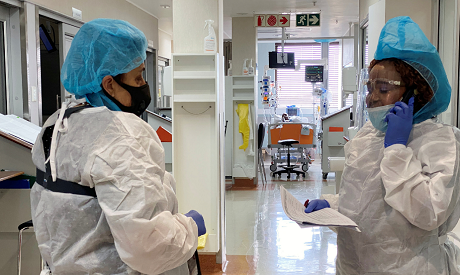
A medical staff speaks on a phone as she attends to a COVID-19 patient at a special ward at Arwyp Medical Centre, as South Africa is about the reach a milestone of 1 million infections, in Kempton Park, South Africa, December 25, 2020. REUTERS
South African President Cyril Ramaphosa has reimposed a ban on alcohol sales and ordered the closure of all bars as part of new restrictions to help the country battle a resurgence of the coronavirus, including a new variant.
In a nationwide address Monday night, Ramaphosa also announced the closure of all beaches and public swimming pools in the country's infection hotspots, which include Cape Town, Johannesburg, Durban and several coastal areas.
South Africa will extend its nighttime curfew so all residents must be at home from 9 p.m. until 6 a.m., the president said.
The president said that wearing masks is mandatory and that anyone found not wearing a mask in a public place will be subject to a fine or a criminal charge punishable by a possible jail sentence.
THIS IS A BREAKING NEWS UPDATE. AP's earlier story follows, below.
JOHANNESBURG (AP) _ With a new surge pushing South Africa's cumulative virus cases above 1 million, the country's doctors are urging the government to return to tighter restrictions on social gatherings and the sales of alcohol to slow the spread of the disease.
South African President Cyril Ramaphosa has held an emergency meeting of the National Coronavirus Command Council and has announced he will speak to the nation Monday night.
The country surpassed the 1 million mark on Sunday night when it reported 1,004,413 cumulative cases of COVID-19, including 26,735 deaths.
South Africa is battling a variant of COVID-19 that is more infectious and has become dominant in many parts of the country, according to experts.
The South African Medical Association, representing the country's doctors, nurses and health workers, warned on Monday that the health system is on the verge of being overwhelmed by the combination of higher numbers of people with COVID-19 and people needing urgent care from alcohol-related incidents. Many festive gatherings during the holidays involve high levels of alcohol consumption, which in turn often lead to increased trauma cases.
``To alleviate the pressure on the system during this time of the year, where we only have skeleton staff working, especially in the public sector, as well as in the private sector, we are asking for stricter restrictions regarding social gatherings,'' Angelique Coetzee, chairwoman of the medical association told The Associated Press.
``South Africa has got a history of very high alcohol abuse and binge drinking, especially over the weekends. In certain areas that leads to a lot of trauma cases, assaults, motor vehicle accidents and domestic violence,'' she said.
The organization has called on the government to impose stricter restrictions on the sale of alcohol, especially where large gatherings are concerned.
When South Africa had a total ban on liquor sales, trauma cases in hospitals dropped by as much as 60%, according to government? statistics. When the ban on alcohol sales was lifted, the trauma cases went back up to previous levels.
Seeing a resurgence of the disease in early December, South Africa limited sales of alcohol to Monday through Thursday between the hours of 10 a.m. to 6 p.m. The country also has a nighttime curfew between 11 p.m. and 4 a.m.
Various alcohol traders have pleaded with the government to avoid a total ban on alcohol sales, citing the economic damage it would cause. South Africa's alcohol industry was among those hardest hit when the country imposed a hard lockdown during the months of April and May, banning all liquor sales.
South Africa's 7-day rolling average of daily new cases has risen over the past two weeks from 11.18 new cases per 100,000 people on Dec. 13 to 19.87 new cases per 100,000 people on Dec. 27.
The 7-day rolling average of daily deaths in the country has risen over the past two weeks from 0.26 deaths per 100,000 people on Dec. 13 to 0.49 deaths per 100,000 people on Dec. 27.
CREATE NEW
Short link: